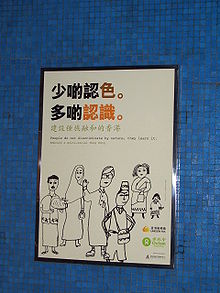- Cross cultural sensitivity
-
 A poster encouraging cross cultural awareness in a Hong Kong subway station.
A poster encouraging cross cultural awareness in a Hong Kong subway station.
Cross cultural sensitivity is the quality of being aware and accepting of other cultures. This is important because what seems acceptable in some countries can be rude or derogatory in others.
A person who is culturally sensitive is aware that there could be differences between their culture and another person’s, and that these differences could affect their relationship and the way they communicate with each other. A culturally sensitive person would understand other countries’ traditions and ways of life, or attempt to learn and apply new understandings. Importantly, culturally sensitive people attempt to be free from prejudices and preconceptions about other cultures.
Contents
Importance
Tolerance, inter-cultural dialogue and respect for diversity are more essential than ever in a world where peoples are becoming more and more closely interconnected.—Kofi Annan, Former Secretary-General of the United Nations, [1] In some countries, photography of government buildings or monuments is a criminal offence
In some countries, photography of government buildings or monuments is a criminal offence
Cross cultural sensitivity is seen as an essential skill in today's world. Many employers see it as an essential skill. Cross cultural awareness is important when dealing in international relations or trade. It can mean the difference between a brand succeeding or failing in international markets.
Cross cultural sensitivity is an important skill in any profession that requires interpersonal communication. People in these professions need to be aware of the cultural factors that may affect others.
It is important as a traveller as well, knowing what is acceptable and what is not is a vital skill. When travelling to different countries in which one is unfamiliar it is always best to do research prior to travelling. This can help prevent the embarrassment of yourself and those around you.
Being cross-culturally sensitive
Being cross-culturally sensitive is important, however, it is not as easily done as it is said. Having cross-cultural competence requires research to gain a better understanding and an informed view of the culture. Working with people of different cultures and ethnic groups helps people become cross-culturally aware.
Many travel guides contain information about the culture and traditions of the country covered. This can help you gain a better understanding of how to behave during your stay in that country.
Examples
Examples showing the importance of Cross Cultural Sensitivity and awareness are:
An American Company that manufactures golf balls packaged the balls in packs of four. They were successful and began selling internationally. However they were not so successful in Japan, where the number four holds the meaning of death.[2]
In 2002 Unity College, Murray Bridge began a Student Exchange Program with Chuo University Suginami High School in Tokyo, Japan. This program has been extremely successful due to the both school's focus on Cross Cultural Awareness. This type of program is one of the many examples of Cross Cultural Awareness having a large positive effect on any group of people.[3]
Cross Cultural Sensitivity is illustrated in the 1992 Comic Series Harvey & Norma by Jason Guist. In the now infamous edition, Harvey and Norma's World Travels, Harvey finds himself incarcerated after climbing atop a golden statue of Buddha. It was Harvey's lack of Cross Cultural Sensitivity and Awareness that caused this clear act of degradation of something holy. This act was repeated on the poster for the movie Hollywood Buddha. This caused great protest in Sri Lanka, Malaysia and Burma where the poster was shown.[citation needed]
Multiculturalism
The term multiculturalism generally refers to an applied ideology of racial, cultural and ethnic diversity within the demographics of a specified place, usually at the scale of an organization such as a school, business, neighborhood, city or nation.
Due to immigration (including increased acceptance of refugees), countries are increasingly becoming multi-cultural societies. Foreigners bring trade that can be conducive to increased economic activity, but it can also lead to social pressure and stressors from changes in population dynamics.[citation needed]
See also
References
- ^ http://www.un.org/News/Press/docs/2004/sgsm9195.doc.htm. United Nations. Retrieved on 2009-04-06
- ^ http://www.kwintessential.co.uk/cultural-services/articles/cultural-sensitivity.html. Kwintessential. Retrieved 2009-04-06
- ^ http://www.unitycollege.sa.edu.au. Unity College. Retrieved 2009-04-06
Categories:- Culture terms
- Cross-cultural studies
Wikimedia Foundation. 2010.
